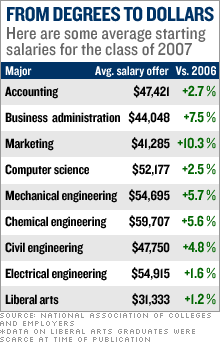despite all the aggressive ignorance here, there is a place for liberal arts. liberal arts fulfill a piece of life that skilled work doesn't. without musicians, or artists, how fulfilling would life really be? no television, no artistic movies, no good music, no beautiful pictures to look at. where does that leave magazines like national geographic without liberal arts? a lot of science can be tied to liberal arts. everyone says "oh, i am glad i'm in business, because i won't be a loser making 35g's a year." well, every good business needs an artist. every good marketer needs a good artist, or to be artistic.
then there is the whole aspect of how liberal arts impacts our abilities to learn in other subjects. most good private schools, and colleges require students to take liberal arts or fine arts. it's been shown in study after study that students who do art and music learn math and science much more efficiently.
i think i can find a great study if needed, but it says that students who spend some time in math, and some time in music, will learn, retain, understand, and test better than students who spend the whole time just doing math.
there is a place for liberal arts in the world. it's not a career for me i don't think. but without it, life would hardly be worth living.





